 Abraham Lincoln
If given the truth, the people can be depended upon to meet any national crisis...
Abraham Lincoln
If given the truth, the people can be depended upon to meet any national crisis...
 Guildford news...
for Guildford people, brought to you by Guildford reporters - Guildford's own news service
Guildford news...
for Guildford people, brought to you by Guildford reporters - Guildford's own news service
College’s Tree Planting Scheme Includes Surrey’s First Miyawaki Forest
Published on: 16 Aug, 2024
Updated on: 22 Aug, 2024
Working in collaboration with Surrey County Council’s tree planting and establishment team, Merrist Wood College in Worplesdon is participating in two on-campus projects to support a three-year woodland creation initiative establishing a fast growing Japanese Miyawaki mini forest.
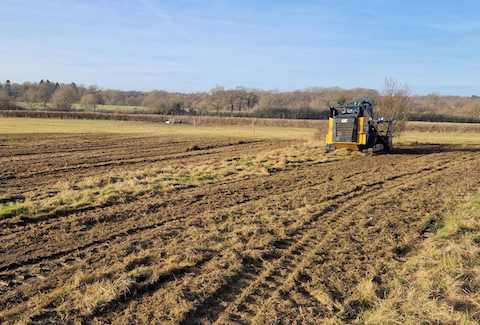
Clearing the ground for the Miyawaki forest.
Arboriculture, countryside, horticulture and landscape students at the college have spent the past few months navigating some challenging weather conditions to successfully plant native trees for the woodland creation project, as well as creating a Miyawaki forest within the college grounds.
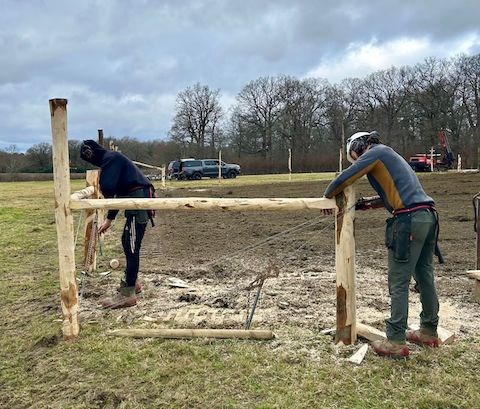
Students building a perimeter fence around the area of the planned Miyawaki forest.
Nearly 3,000 native trees and shrubs have been provided to the college by Surrey County Council to support its climate change goal.
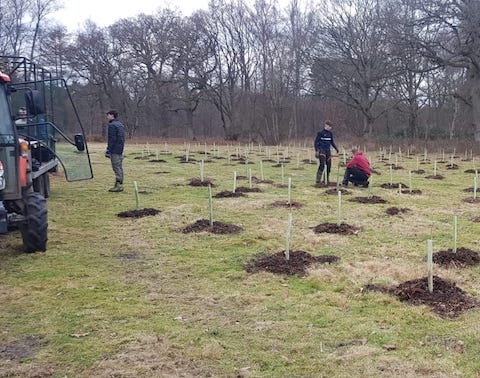
Traditional woodland planting.
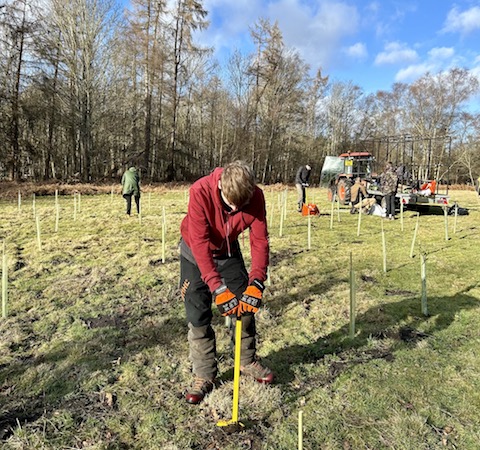
Woodland area tree planting.
The traditional woodland planting saw the first 250 trees, including oak, rowan, holly and hawthorn, planted by the college’s Level 2 and 3 arboriculture, countryside, horticulture and landscape students, marking the beginning of a nurturing process over the next few years.
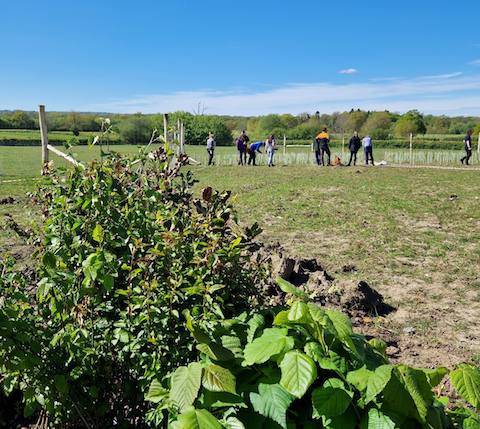
Miyawaki Forest horticulture students planting 2,300 saplings on the site in April.
The college says the plan to plant 250 native trees in 2025 and a further 250 in 2026 will benefit successive student cohorts, maximising their learning opportunities and experience.
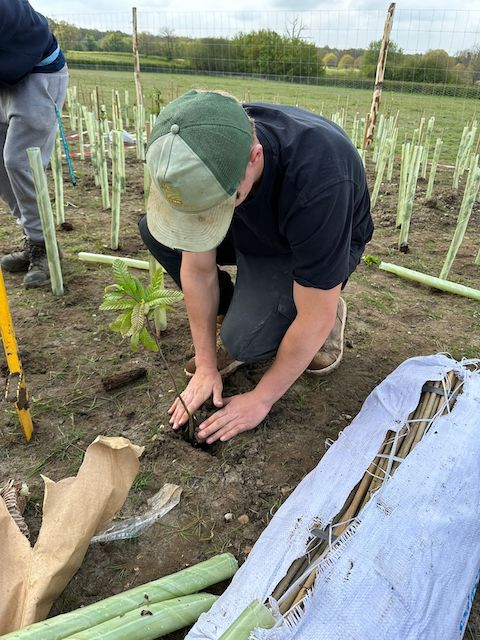
Miyawaki Forest student planting one of 2,300 saplings.
The college’s group director Joanne Manser said: “Not only does this initiative contribute significantly to combating climate change, but it also provides our students with invaluable hands-on experience and practical knowledge in arboriculture, conservation, and sustainable practices.”
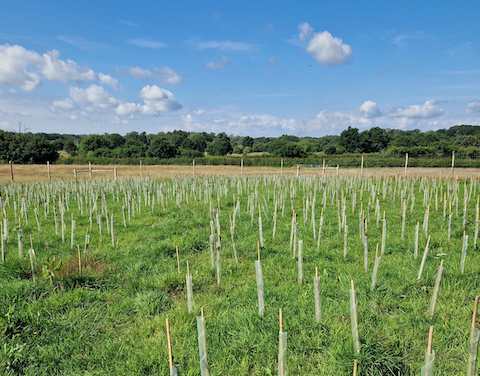
Miyawaki Forest saplings in the sunshine.
Students have also been instrumental in establishing a Miyawaki forest, a collection of more than 2,300 trees including sweet chestnut, hazel, hawthorn, holly and dog rose among the native trees and shrubs planted, it being the only example of its kind in Surrey.
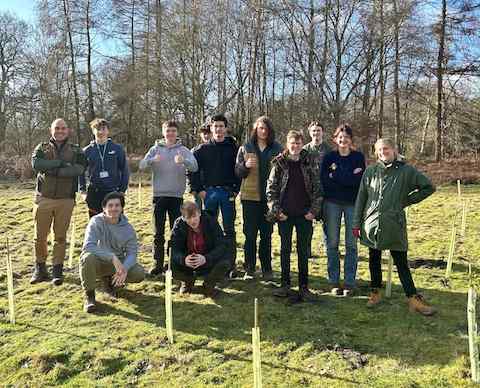
The team involved in the project.
A Miyawaki Forest is a dense, native forest created using a method developed by Japanese botanist Akira Miyawaki and involves planting a variety of native species close together, fostering rapid growth, robust structure and biodiversity. The forests are designed to mimic natural ecosystems, growing up to 10 times faster than conventional reforestation efforts.
The college adds they need very little upkeep after the first growth phase and greatly help in absorbing carbon dioxide, improving soil quality, and cooling down city areas.

Click on cartoon for Dragon story: Public Asked for Views on SCC’s Proposal for Reduced Speed Limits






Recent Articles
- Dragon Review: The Pajama Game – Yvonne Arnaud Theatre
- A Hidden Gem in the Hills: Michelin-Backed William IV Pub Brings Refined Dining to Albury
- Letter: Help Reduce Speeding By Joining a Community Speedwatch Team
- Hospital Apologises ‘Unreservedly’ After Death of Disabled Girl
- Birdwatcher’s Diary No.328
- SCC Intends to Back Public Survey Result and Shorten Summer School Holidays
- A281 Expected to Remain Closed Until Repairs to Damaged Cottage Are Completed
- Surrey Heath Selling Assets to Maintain Essential Services
- Community Councils Proposed to Maintain Local Representation
- Highways Bulletin – A320 Weekend Closures


Search in Site
Media Gallery
Dragon Interview: Local Artist Leaves Her Mark At One of England’s Most Historic Buildings
January 21, 2023 / No Comment / Read MoreDragon Interview: Lib Dem Planning Chair: ‘Current Policy Doesn’t Work for Local People’
January 19, 2023 / No Comment / Read MoreA3 Tunnel in Guildford ‘Necessary’ for New Homes, Says Guildford’s MP
January 10, 2023 / No Comment / Read More‘Madness’ for London Road Scheme to Go Ahead Against ‘Huge Opposition’, Says SCC Leader
January 6, 2023 / No Comment / Read MoreCouncillor’s Son Starts Campaign for More Consultation on North Street Plan
December 30, 2022 / No Comment / Read MoreCounty Council Climbs Down Over London Road Works – Further ‘Engagement’ Period Announced
December 14, 2022 / No Comment / Read MoreDragon Interview: GBC Reaction to the Government’s Expected Decision to Relax Housing Targets
December 7, 2022 / No Comment / Read MoreHow Can Our Town Centre Businesses Recover? Watch the Shop Front Debate
May 18, 2020 / No Comment / Read More






Recent Comments